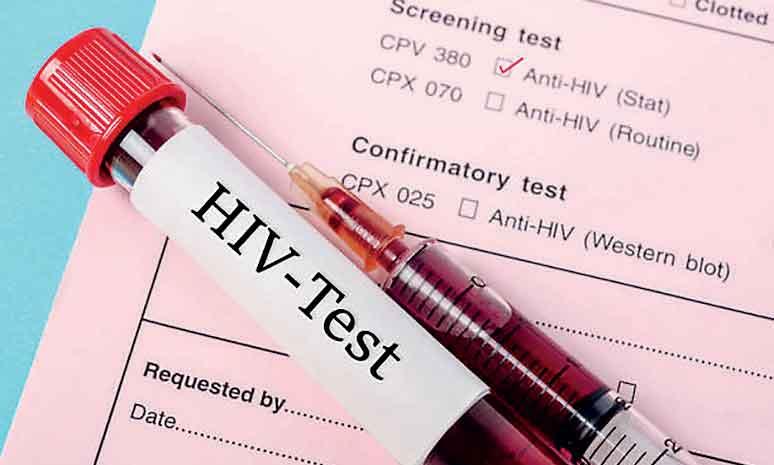02 Dec 2024 - {{hitsCtrl.values.hits}}

|
The number of newly detected HIV patients in Sri Lanka currently remains higher among the male population Therefore, counselling services are identified as an important component of management. |
 Resonating with the health and welfare of over 39.9 million HIV patients living globally, World AIDS Day, marked on December 01 every year is a timely reminder reflecting on the importance of raising awareness and prevention of the Human Immunodeficiency Virus (HIV). According to World Health Organization (WHO) statistics, an estimated 1.3 million people have contracted HIV in 2023. The WHO theme for this year’s World AIDS Day, ‘Take the Right Path: My Health, My Right!’ sheds more light on the need to promote one’s right to health globally.
Resonating with the health and welfare of over 39.9 million HIV patients living globally, World AIDS Day, marked on December 01 every year is a timely reminder reflecting on the importance of raising awareness and prevention of the Human Immunodeficiency Virus (HIV). According to World Health Organization (WHO) statistics, an estimated 1.3 million people have contracted HIV in 2023. The WHO theme for this year’s World AIDS Day, ‘Take the Right Path: My Health, My Right!’ sheds more light on the need to promote one’s right to health globally.
Situation in Sri Lanka
|
Dr. Vindya Kumarapeli - Consultant Community Physician and Director of the National STD/AIDS Control Programme (NSACP)
|
Given the increasing trend of HIV patients detected in Sri Lanka this year, the theme for this year’s World AIDS Day hits closer to home than ever before. Speaking to Daily Mirror, Consultant community physician and Director of the National STD/AIDS Control Programme (NSACP), Dr. Vindya Kumarapeli expressed concerns that a notable increase of HIV positive cases was detected among Sri Lankan youth, where 15 percent of the HIV positive patients identified in 2023 were between the age group of 15 - 24. Dr. Kumarapeli observed a continuation of this trend as the second quarter of 2024, recorded 28 males within the same age group.
“The number of newly detected HIV patients in Sri Lanka currently remains higher among the male population, with a male-to-female ratio of 7:1 being recorded from April to June, this year”, Dr. Kumarapeli added. As of now, close to 500 new HIV cases have been detected this year, while 214 new HIV positive cases have been detected from April – June. Interestingly, the surge observed in HIV/AIDS patients in the second quarter also remains the highest number of cases logged in a single quarter since 2009.
Currently, the western province, including coastal areas such as Galle, Matara, Puttalam, and Hambanthota have been identified as areas having recorded a notably higher prevalence of HIV cases. Dr. Kumarapeli observed that this increase is likely due to the high population density observed within the respective regions.
HIV Affect on Immunity
Delving deeper into the health issues associated with HIV/AIDS, Dr. Kumarapeli said that it is imperative to raise more awareness, focused on understanding the medical condition, its early detection, and prevention. According to the WHO standard definition, HIV is a virus that targets cells of the immune system, called CD4 cells, which help the body respond to infection. Within the CD4 cell, HIV replicates and in turn, damages and destroys the cell. Without effective treatment of a combination of antiretroviral (ARV) drugs, the immune system will eventually weaken to the point that it can no longer fight infections and diseases.

“HIV is primarily asymptomatic in its early stages; however, it is an immunodeficiency virus that can progress to Acquired Immunodeficiency Syndrome (AIDS) after a period of approximately six to seven years. AIDS represents the most advanced stage of the HIV infection, which cannot be fully cured, but managed with continued treatment and care”, Dr Kumarapeli explained.
HIV is mainly contracted due to unsafe sexual behaviour. Although Sri Lanka has successfully eliminated mother to child transmission of the disease, the overall prevalence of new infections continues to remain a significant concern. This ongoing issue is largely attributed to high-risk sexual behaviours, including inadequate use of condoms, involvement with multiple sexual partners, and unsafe practices such as sharing needles and syringes.
Importance of Prevention and Early Detection
The long-term consequences of being diagnosed with HIV could have a profound impact on patients as the condition could have ripple effects not only physically, but also on the social, psychological, and ethical aspects. Diagnosis of HIV is only possible through a screening test. People with high-risk sexual behaviour are recommended to get themselves screened for HIV as early detection plays a major role in helping manage the
condition better.
Dr. Kumarapeli explained that patients are treated through Antiretroviral Therapy (ART), which is key to lowering the amount of HIV in the blood to untraceable levels (viral load suppression). This means that HIV cannot be transmitted to another. The National STD/AIDS Control Programme operates as the sole provider of ART in Sri Lanka. These drugs are provided free of charge to patients diagnosed with HIV. Currently, female sex workers (FSM), men who have sex with men (MSM), people who inject drugs (PWID), beach boys (BB), and transgender women (TGW) have been identified as the most vulnerable to contracting HIV.
Additionally, the social stigmatisation associated with HIV/AIDS and the mental toll this has on patients often goes unnoticed. Therefore, counselling services are identified as an important component of management. The Ministry of Health has ensured that all healthcare workers attached to STD clinics are given training in counselling. Counselling services are offered during diagnosis, on prevention, ART adherence, family planning, disclosure, pregnancy, and various social issues.
“To effectively address the issue of HIV among our youth population in Sri Lanka, we need to increase awareness of the available health services. Educating young people about these resources is essential in reducing the number of reported HIV cases. By promoting proper treatment options, we can significantly help prevent the progression of the disease to AIDS and support the health and well-being of our community”, Dr Kumarapeli added. The National STD/AIDS Control Programme (NSACP) has also launched a dedicated website, www.know4sure.lk to cater to the health concerns of HIV/AIDS patients. The website helps assess the HIV/AIDS risk in vulnerable patients. Through the website, assistance is also provided to obtain a self-test kit confidentially from the comfort of one’s home.
Dr. Kumarapeli emphasises that practicing safe sex, such as avoiding unprotected sex and limiting partners, is key to minimising transmission risk. Regular testing for vulnerable populations, especially among young people, can help identify infections early on and ensure timely intervention. To enhance these efforts, comprehensive awareness campaigns are quintessential. Therefore, educating vulnerable groups concerning HIV/AIDS risks and preventive measures empowers individuals to make better and informed choices. By equipping people with essential knowledge, a healthier and safer future could be created for everyone within the community.
21 Dec 2024 21 Dec 2024
21 Dec 2024 21 Dec 2024
21 Dec 2024 21 Dec 2024
21 Dec 2024 21 Dec 2024
21 Dec 2024 21 Dec 2024